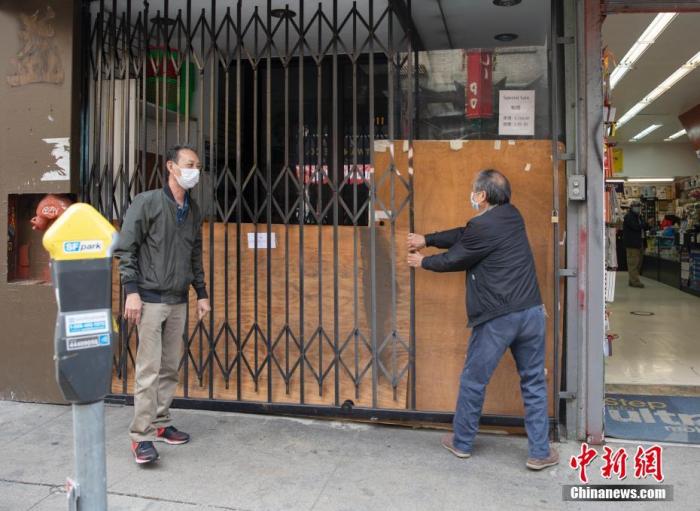China News Service, San Francisco, May 19 Question: Chinese tourism practitioners: "We are the first to be hit, and the recovery is also the slowest."
China News Service reporter Liu Guanguan
On May 18th local time, the San Francisco Bay Area further restarted its economy, and certain types of street shops in San Francisco and other areas can reopen the door by way of roadside pickup. However, because there are few tourists, many shops in Chinatown, San Francisco ’s well-known attractions, are still closed. After a shop selling clothing, gifts and other goods reopened that morning, the door was closed again at noon. The shop owner who hurried away told the reporter: "Without guests, the opening and closing are the same."
Mr. Zhao, a Cantonese who has lived here for more than ten years, is familiar with the conditions of the surrounding shops. He pointed to a shop across the road that reopened the same day and said: "The landlord refuses to reduce the rent, that shop will close the door after selling the surplus." He said that similar situations have been common in Chinatown recently.
On May 18th, local time, after reopening a store in San Francisco, China, the door was closed at noon. China News Service reporter Liu Guanguan
The sudden new outbreak of pneumonia has affected the global tourism industry, and industries supported by tourists are not spared.
Jia Xuefeng, a Shandonger who has been immersed in the tourism industry for many years, has never encountered the same professional difficulties as this spring. Shengshi International Travel Company, which he operates in the San Francisco Bay Area, is mainly engaged in private customized travel for tourists from Mainland China. In the peak summer tourism season of the first few years, "8 cars were running at the same time". Jia Xuefeng believes that the booming tourism scene will not be reproduced in recent years.
"We are the first to be hit, and the recovery is also the slowest." Jia Xuefeng admitted that "international tourism may be difficult to recover within two years." The reason he gave is that income is affected by the epidemic and will affect the travel plans of tourists. In addition, the risk of being infected during the journey will also deter tourists.
Jia Xuefeng's ideas were confirmed in the "New York Times" report. The report said that in comparison, the international tourism industry will take longer to recover. The time for unblocking varies from country to country, which may cause travel difficulties for travelers. Administrative procedures for crossing borders will be more complicated than before, and security inspections will be stricter.
Jia Xuefeng's business was originally scheduled for mid-April, but after the epidemic spread in the United States, orders were cancelled one after another. The last tour group he received consisted of students from a university in Nanjing who came to the United States for training. The training was originally scheduled to end on February 10, but as the US epidemic developed, the school asked students to return to China 10 days in advance. After sending the students to the plane on February 1, Jia Xuefeng never took over the tourism business again.
After the outbreak, he sold a small car that was running a business. Jia Xuefeng heard that there is a large-scale counterpart, and now there are only two of the more than 20 buses. The high cost of "car maintenance" makes vehicles a burden for many travel agencies, and selling cars becomes their only option.
The uncertain prospects for epidemic prevention forced Jia Xuefeng to reconsider his career plan. "We need to stick to it again and again. My bottom line is next summer." Jia Xuefeng said, "If the situation is not optimistic, the possibility of switching is very high."
Xu Kun, general manager of Great Wall International Travel Agency, entered the Los Angeles-based travel agency in 1998. Over the past 20 years, he has witnessed the rapid growth of the number of Chinese overseas tourists.
The travel agency where Xu Kun is located mainly receives business groups from China in the fields of medical, electronics and machinery. He said that the tourism industry was really good in the past few years. When there is a lot of business, there are more than 20 tour groups a month, and thousands of people have been received.
Xu Kun said that many meetings scheduled this year have been cancelled. Helping scattered Chinese students to arrange return trips has become the main business he can do at present.
Xu Kun said that the rent to be paid by the travel agency and the wages of the employees put great pressure on the travel agency. In addition, "I don't know when the epidemic will improve, which is scary."
Yang You, who is a B & B manager in the San Francisco Bay Area, helps the landlord manage more than a dozen B & Bs. She said that there were orders from April to August, especially from April to June. As soon as the epidemic came, people who traveled and traveled canceled their itineraries. In the early summer of previous years, it was a busy time for Silicon Valley homestay managers. Stanford ’s graduation season attracted parents who came from all directions. And this year, parents can only wish their children a safe journey through the graduation season with some regrets, and successfully open the door to a new stage of life.
At the corner of a major street in San Francisco ’s Chinatown, the same glass door shared by the "Happy Travel" travel agency and the accounting firm, real estate agency, and massage parlour remains closed. No one knows when this door will reopen. (Finish)

